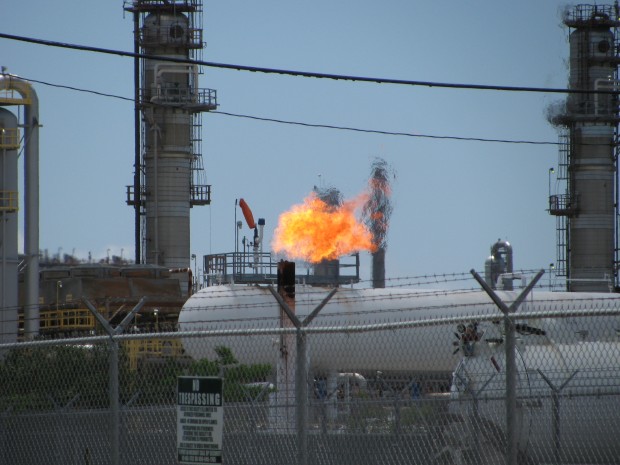How Mass Lawsuits Could Change the Oil and Gas Industry

Dave Fehling/StateImpact Texas
Houston Lawyer Anthony Buzbee: "The new way of going about it is massive, massively large cases like the one in Texas City "
The Houston law office of Anthony Buzbee is on the 73rd floor of the tallest building in Texas. There are only two more floors to the top. The furniture is modern, so is the artwork on the walls. It all reflects the success Buzbee has had suing some of the nation’s biggest companies. And now he says he has a new approach to make companies compensate people who’ve lived near chemical plants that have had pollution problems.
“It’s saying a lot that these people who’ve put up with so much have finally decided the state is failing us, the EPA is failing us, we’re going to try to do it ourselves through the court system,” Buzbee said in an interview with StateImpact Texas.
Buzbee just helped file a lawsuit in Iowa against a company that processes grain to make ethanol. He says he expects to sign up “thousands and thousands of Iowans”. It’s a case that in many ways seems to mimic what Buzbee is doing in Texas City. There, Buzbee says some 40,000 residents are part of his firm’s mass lawsuit against BP’s long-troubled Texas City refinery.
“The new way of going about it is massive, massively large cases like the one in Texas City,” said Buzbee.
Buzbee said instead of attempting to get very large monetary awards for a few people (say, victims of a chemical explosion), the suits in Iowa and Texas will seek to get more modest awards for thousands of people who individually will claim less-than-catastrophic injuries (say, an allergic reaction to pollutants a few times a year).
“Even if a jury only awards you $500, $10,000 at most (per client), if you have 40,000 clients, all of a sudden they (the companies) stand up and take notice,” said Buzbee.
In the action against BP, Buzbee is focusing on the impact on the surrounding community of a month-long flaring of flammable vapors in 2010 that resulted after some equipment malfunctioned.
In court documents, BP maintained that the pollution from the flaring was not “above any exceedance of the national ambient air quality standards” and therefore “no adverse health consequences could have resulted from the flaring giving rise to this litigation”.
Mass lawsuits (which sometimes are deemed “class actions”) are hardly novel but there may be a new twist to what Buzbee is attempting.
“That principle of bringing a bunch of people with small claims into a class action is nothing new but it is a little bit more unusual in this context for an environmental tort,” said Jeffrey Rensberger, an expert on class action litigation at South Texas College of Law in Houston.
“Most environmental tort litigation has been for catastrophic kinds of losses where you have large damages (for a few people),” said Rensberger.
Both the grain processing plant in Iowa and the BP refinery in Texas City have appeared in the past on a U.S. Environmental Protection Agency “watch list”. The list was revealed last year in reporting by NPR and the Center for Public Integrity. Called “Poisoned Places“, the series of reports highlighted communities exposed to toxic pollutants and showed how much was known by the government and “how little it has done to address it.”
Buzbee said his mass lawsuits will accomplish what government regulators have failed to do.
“You know, people bash lawyers but private litigation is really the only avenue,” said Buzbee.
Not exactly. Late last year, the State of Texas did take action against BP. The Texas Attorney General announced that BP had agreed to pay the state $50 million for “unlawful pollutant emissions” primarily from a deadly explosion in 2005 but also for the 2010 flaring that the attorney general said resulted in “multiple Texas Clean Air Act violations”.
The $50 million will go to the state’s treasury, not the residents and Buzbee contends the settlement is not significant to a company as big as BP.
Not surprisingly, the chemical industry tells a different story. BP said it has spent over a $1 billion improving its Texas City refinery. The Iowa company, Grain Processing Corporation, said it’s spending $100 million dollars to make improvements to reduce pollution at it’s facility in Muscatine, Iowa.
What’s more, a group that represents the industry, the American Chemistry Council, told StateImpact in an email that “the enforcement system is working. Chemistry companies have made remarkable progress in environmental performance…”
The Council touts a program it started called “Responsible Care.” It tries to persuade companies that making facilities both safer for workers and less toxic to the environment can lead to higher profits, partly by reducing legal liabilities.
“Since 1988, Responsible Care companies have reduced hazardous releases to the air, land and water by more than 75 percent,” said the Council’s email to StateImpact.



